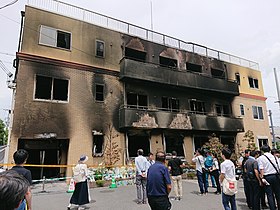Our website is made possible by displaying online advertisements to our visitors.
Please consider supporting us by disabling your ad blocker.
Arson
The examples and perspective in this article may not represent a worldwide view of the subject. (June 2021) |

| Criminal law |
|---|
| Elements |
| Scope of criminal liability |
| Severity of offense |
|
| Inchoate offenses |
| Offense against the person |
|
| Sexual offenses |
| Crimes against property |
| Crimes against justice |
| Crimes against the public |
| Crimes against animals |
| Crimes against the state |
| Defenses to liability |
| Other common-law areas |
| Portals |
| Part of a series on |
| Terrorism and political violence |
|---|
Arson is the act of willfully and deliberately setting fire to or charring property. Although the act of arson typically involves buildings, the term can also refer to the intentional burning of other things, such as motor vehicles, watercraft, or forests. The crime is typically classified as a felony, with instances involving risk to human life or property carrying a stricter penalty. Arson that results in death can be further prosecuted as manslaughter or murder. A common motive for arson is to commit insurance fraud.[1][2][3] In such cases, a person destroys their own property by burning it and then lies about the cause in order to collect against their insurance policy.[4]
A person who commits arson is referred to as an arsonist, or a serial arsonist if the person has committed arson several times. Arsonists normally use an accelerant (such as gasoline or kerosene) to ignite, propel, and direct fires, and the detection and identification of ignitable liquid residues is an important part of fire investigations.[5] Pyromania is an impulse control disorder characterized by the pathological setting of fires.[6] Most acts of arson are not committed by pyromaniacs.[6]
- ^ "Arson". FindLaw. Archived from the original on January 5, 2019. Retrieved January 4, 2019.
- ^ arson Archived February 10, 2008, at the Wayback Machine. Dictionary.com. The American Heritage Dictionary of the English Language, Fourth Edition. Houghton Mifflin Company, 2004. Accessed: January 27, 2008
- ^ "StackPath". December 13, 2010. Archived from the original on January 27, 2021. Retrieved November 23, 2020.
- ^ Zalma, Barry (January 8, 2014). "Fraud Proved – Lie About Cause Of Fire Sufficient to Support Guilty Verdict". LexisNexis. Archived from the original on January 5, 2019. Retrieved January 4, 2019.
- ^ Almirall, José R.; Furton, Kenneth G., eds. (2004). Analysis and interpretation of fire scene evidence. Boca Raton: CRC Press. ISBN 978-0849378850. OCLC 53360702.
- ^ a b Burton, Paul R.; McNiel, Dale E.; Binder, Renée L. (November 2012). "Firesetting, arson, pyromania, and the forensic mental health expert" (PDF). Journal of the American Academy of Psychiatry and the Law. 40 (3): 355–365. PMID 22960918. Archived (PDF) from the original on January 5, 2019.
Previous Page Next Page


